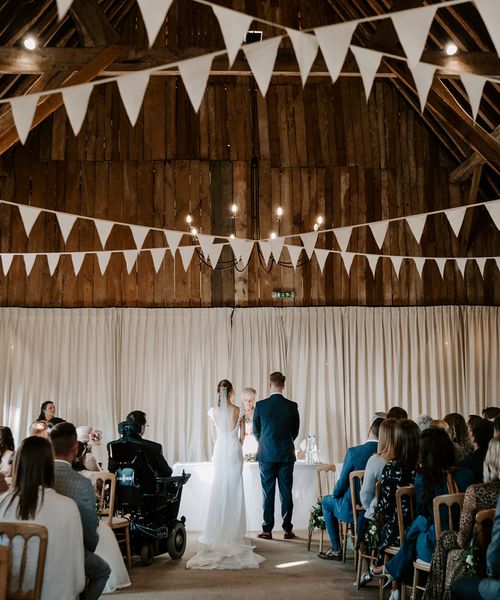
Accessible Wedding Ceremony Tips
Photography by Folk and FilmBecky: You will probably recognise the name Celebrant Kathryn by now. A few weeks back Kathryn wrote to you about how to choose an accessible venue and today she is back talking specifically about how to have an accessible wedding ceremony. Over to Kathryn...
Accessible wedding ceremony tips
Kathryn Palmer-Skillings
Kathryn: If you’re planning a wedding and need to consider your physical mobility or energy levels for your accessible wedding ceremony then you might have also seen my recent post about choosing a venue. In this article, we’ll look at other aspects of your ceremony and wedding day.
Remember as I said in part one, don’t compromise on your RIGHT to feel celebrated. There are so many genuinely inclusive suppliers across the wedding industry who will work with you as an equal and will be committed to making sure you have the wedding day you want that not only works for you but is so purely about celebrating you both and your love you will not only feel good - you’ll feel fabulous!
Do you have to have an aisle?
I know lots of people want to include this element in their ceremony and there are lots of ways an aisle entrance can work for you. I’ll come to these later on, but for now, let me say...
There is nothing anywhere that says you have to arrive down the aisle unless you absolutely want to. There are lots of alternatives that can still give you a moment of reveal if you want it. There are also options if you want a more relaxed start to your wedding ceremony.
Have you considered a reverse aisle? Where you are in your ceremony spot before your guests and greet them as they arrive. I’ve created a ceremony where the couple just didn’t feel comfortable making a big entrance, so they were already at the front with me as guests arrived. This has the added benefit of making sure you get to say hello to everyone.
You could also think about having a ‘first look’ together before the ceremony. That way, you get a reveal moment together and can then either skip the entrance altogether or what not enter as a couple.
Alternatives to wedding aisles
If you do want to have the experience of entering down an aisle but are maybe concerned by the distance or time, you could think about entering the ceremony space from a different direction to lessen this. This is especially easy to achieve in an outdoor ceremony setting that tends to be more flexible.
Also if you are considering walking down the aisle with someone and have heard that there is a ‘side’ that you ‘should’ walk - feel able to ignore this! Have the support of their arm on whichever side works for you.
Equally - if you’re thinking you’d like to walk down the aisle but you’d like some more physical support, then why not consider walking with both your parents or with a sibling or close friend on either side. These choices come with added #DisamantlingthePatriachy credentials too.
Using chairs during the ceremony
When you get to the end of that aisle, or once the ceremony is about to start, again there’s no reason you can’t both sit down. Plenty of couples do anyway. This may enable you to conserve energy, manage your pain and generally do what you need to be able to enjoy and focus on all those meaningful words and beautiful wedding vows. There’s also no need to get up and sit back down again at various points during the ceremony unless you want to of course
Also a note here on your guests too. You don’t have to have to stand up and sit down again either, especially if your guests include people for whom this might be difficult. I make a point of saying ‘I invite those who are able to stand’ as opposed to ‘please stand’ in all the ceremonies I write unless I’m asked to include something specific.
Not all of these tips will work for everyone, not everyone with a physical impairment faces the same barriers - of course! - we are all individuals. Hopefully, these ideas will make you confident in making decisions about your wedding day, make it feel good, fabulous and make your accessible wedding ceremony, accessible to you and/or your guests.
If you missed part one of choosing a venue you can see that here. Ther is also a piece on neurodiverse and wedding planning to check out if that's relevant to you.
Becky: Thanks to Kathryn for writing about accessible wedding ceremonies, we hope you have found it helpful. If you are planning a wedding and thinking about mobility, you can read more on Kathryn's blog.

